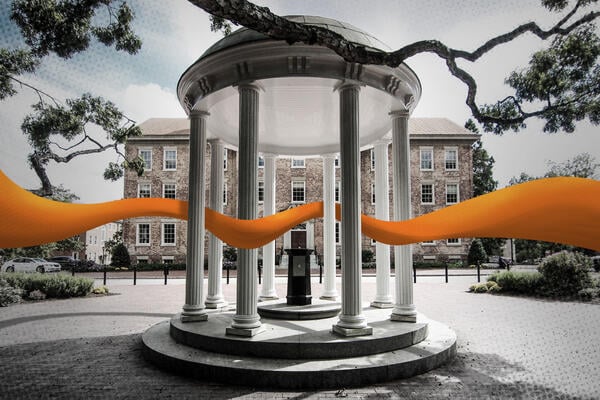Shortly after the second Trump administration began attacking higher education diversity initiatives, the University of North Carolina system ordered its 16 public universities to immediately stop requiring “course credits related to diversity, equity and inclusion.” The system was targeting DEI even before Trump retook office—the UNC Board of Governors repealed the system’s DEI policy a year ago—and its general counsel pointed to the federal government’s newly threatened funding cuts to justify this further step.
But the system’s kibosh on DEI requirements came with caveats. Majors could continue requiring courses with diversity themes if university chancellors provided waivers.The system gave chancellors the final say on which major-specific courses would continue to be mandated, and chancellors said waivers were needed because state or national accreditation and licensure criteria require diversity education.
“Approximately 95 percent of the programs identified for waivers at the chancellor level had accreditation and licensure requirements attached to them,” said David J. English, the system’s senior vice president for academic affairs, during a UNC board committee meeting this week. English said these programs are in counseling, education, nursing, psychology and social work.
According to documents attached to this week’s board meeting agenda and previously reported by Raleigh’s News & Observer, dozens of courses will remain necessary for certain majors in the UNC system, which includes all four-year public universities in the state. Among them are Feminist Theory at UNC Asheville; Multicultural Counseling at UNC Charlotte; Social Work Policy and Restorative Justice at UNC Greensboro; Teaching Reading to Culturally Diverse Children at Fayetteville State University; Inclusion, Diversity and Equity in Agriculture at North Carolina A&T State University; and Diversity in Higher Education at North Carolina Central University.
The UNC system is one example of universities across the country being asked to comply with vague statewide and national demands to excise DEI. Lacking detailed guidance, they’ve had to define that term for themselves as they seek to show compliance.
The UNC system never defined for its component institutions what it meant by the verboten “course credits related to DEI.” The universities were left to determine for themselves what they should stop requiring; some administrations used keyword searches of course descriptions, looking for terms such as “cultural” to choose which courses to review.
The Feb. 5 order from the system said universities’ general education requirements couldn’t include mandates for DEI-related courses at all. A few institutions, such as East Carolina University and UNC Asheville, responded by jettisoning broad diversity categories from their gen ed requirements. At UNC Chapel Hill, College of Arts and Sciences dean Jim White wrote that “Power, Difference, and Inequality”—a category within the gen ed curriculum there—“could be incorrectly read or understood to be ‘related’ to DEI,” so it was “streamlined” and is now called “Power and Society.”
But when it came to specific majors’ mandates for DEI-related credits, the system let chancellors grant what it called “tailored waivers” to allow these requirements to continue.
Appalachian State University’s acting provost initially asked the national Council on Social Work Education, which accredits social work programs, to waive accreditation standards that are specifically called “Anti-Racism, Diversity, Equity, and Inclusion.” But when the council refused, Appalachian State chancellor Heather Norris gave her university’s social work program a waiver to continue the education requirements.
Halaevalu Fonongava’inga Ofahengaue Vakalahi, the Council on Social Work Education’s president and chief executive officer, told Inside Higher Ed in an email, “We do not issue waivers except in very limited circumstances as defined by our Educational Policy and Accreditation Standards. Those circumstances are not applicable in this case.
“What we have done, and are continuing to do, is work with programs and institutions to ensure they are both meeting the appropriate standards for accreditation while also staying within the boundaries dictated by law,” Vakalahi wrote. “Social work is about healthy individuals, healthy families, and healthy communities. We value inclusion because we believe that social work is for everyone—no exceptions.”
While the waiver documents released this week show course requirements that survived, they don’t specify whether universities dropped major-specific requirements—and if so, which ones—instead of having their chancellors grant waivers. Universities didn’t provide interviews this week to Inside Higher Ed for this article. But the fact that the system ordered statewide changes to curriculum rather than have the faculties of individual universities propose them has raised academic freedom and shared governance concerns.
‘Faculty Were Not Pleased’
Wade Maki, chair of the UNC Faculty Assembly, said the faculty senates or councils of all 16 universities, plus the one specialized high school in the system, ratified a resolution calling the order to end DEI course requirements “an unnecessary and intolerable breach of the principle of academic freedom” that “deeply undermines” the system’s mission “to serve the people of our state.”
Defending the place of faculty in setting curriculum, the resolution says, “Faculty, who are trained at the highest level of our disciplines, collaborate within our departments, universities and communities to design and lead programs—including defining the core curriculum and graduation requirements—to ensure our students’ growth and success.”
While “faculty were not pleased” about the order, they stepped up to take part in the course review, Maki said. Because the system “did not prescribe how” to comply, “it was up to faculty and administrators to work together to determine what to do,” he said.
“Each major had to look and say, ‘Do we think we’re at risk of being out of compliance here, and what’s the best course of action?’” he said.
Herle McGowan, chair of North Carolina State University’s Faculty Senate, said her university dropped a general ed requirement in response to the system’s order—a requirement that had been created by faculty with student input.
“The fact that it changed without consultation from faculty is definitely concerning to me,” McGowan said.
She said she personally believes academic freedom rights should cover “the broader curriculum,” not just individual faculty teaching and research. Within majors, she said experts should agree on what students need to learn, and when it comes to gen ed, there should be “collaboration from faculty experts all across the university” in determining what students need to be good, well-rounded citizens prepared for life and work.
Regardless of her own views on academic freedom, McGowan said, the fact that the system handed down such an order points to a need for constituents—from faculty to board members—to come to a consensus on what academic freedom means.



